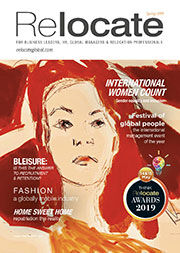Why bleisure is a powerful recruitment tool
Bleisure travel, adding a personal trip onto the end of a business trip, is increasingly popular especially with millenials and younger employees which helps businesses attract and maintain talent.

New ways to combine work and play
This is a huge opportunity for travel companies and accommodation services. If they can gain the next generation’s attention while they’re experiencing the world of travel for the first time, they can leverage the power of brand loyalty for the future.A new Wex/Mastercard survey released at the end of last month (January 2019), (https://www.wexinc.com/wp-content/uploads/2019/01/WEX-2019-US-Travel-Trends-and-Expectations.pdf) entitled 2019 Travel Trends and Expectations, found that the sharing economy was shaking up traditional hotel models. Sharing economy services like Airbnb and Uber appeal most to Gen Z (62 percent) and Millennials (56 percent). For Millennials in particular (53 percent), the advantage is reduced cost, and feeling like a local. Younger users are more engaged with new travel technologies and report being more open to receiving personalized suggestions digitally.Ed Glassman, executive vice president North American markets at Mastercard, said in the report, “Disruptive new services and technologies have made it a very exciting time to be both a consumer and a provider of travel services.”The Wex/Mastercard survey found that when US business travellers were responsible for their own bookings, they tended to book directly with hotels and airlines, using a personal credit card (65%) rather than a company credit card (37%). The use of a personal credit card may reflect a desire to rack up loyalty rewards that they can be redeemed for personal travel, as 62% of frequent flyer program members claim to be very likely to redeem their loyalty points for travel in 2019.Bleisure trips up 40%
According to research by Expedia Group Media Solutions, 60% of corporate travellers globally extend their trips to add some leisure activities. With travellers taking an average of six business trips a year, this has implications for the hospitality industry, which has yet to embrace the concept fully.Expedia Group Media Solutions questioned more than 2,500 travellers from China (511), Germany (515), India (510), the United Kingdom (511) and the United States (504) who had all taken at least one combined business and leisure trip since March 2017.The findings were significant: there had been an almost 40% increase in bleisure travel since the equivalent report in 2016. Business trips that are more than two nights away, and are far from home, are the most likely to be extended to include some personal time for sightseeing.- Serviced apartments: a solution for the tight global housing market?
- Going Wilde: Staycity launches new brand across Europe
- Mapping trends in the serviced apartments sector
Using bleisure to combat talent shortages and boost productivity
Recruiting and retaining the mobile Millennial workforce is a challenge that many established and growing companies face.The trend isn’t only being driven by large enterprises; combining business with leisure is also popular with SMBs. Emma Maslen, MD of UK Enterprise, SAP Concur, says bleisure is a rising trend across the globe.“Increasingly as employees seek to achieve a better work life balance they don’t want to only see the airport of a city,” she says. “Instead they want to embed themselves more in the culture and experiences that their destination has to offer. This trend coincides with upward growth trajectory of the platform economy, the most notable brands including Airbnb, enabling travellers to find cost-effective, flexible accommodation that empowers them to maximise the best of both worlds.”SAP Concur’s data found that 70% of Airbnb bookings included a Saturday night – compared with just 10 per cent for hotel bookings. For hotels, this omission in bookings appears to be something of a missed opportunity.Hotels and the serviced accommodation sector could also play a role in the new appetite for bleisure, especially among Millennials for whom apartments hold great appeal. It is also interesting that some sectors show greater growth. Across the Europe, MiddleEast and Africa (EMEA) region, bleisure is more prevalent in the manufacturing, technology and pharma industries.Accommodation providers could make it simple to add on extra nights or offer a reduced price for the personal portion of the stay. This could reduce the loss of bookings to alternatives such as Airbnb, or apps like Nightly.travel, a hotel booking website that offers combinations of two hotels for a single trip to unlock the best value stays. Nightly.travel claims to analyse room prices for each night and mixes and matches hotel combinations in the best way to give the biggest savings versus a traditional single hotel stay. Learn more about serviced apartments
Learn more about serviced apartmentsMaking rewards worthwhile
Craig Unsworth is founder and CEO of Upgrade Pack, a fintech-based loyalty platform enabling innovative businesses to reward and retain their most valuable customers and employees. The platform provides discounted flight and hotel upgrades.Upgrade Pack’s marketplace technology enables businesses to reward and retain their customers and employees by providing exclusive access to discounted offers on unused premium seats and rooms. It could appeal to global mobility specialists whose employees are looking to increase their bleisure time.Upgrade Pack says it can help businesses retain and recruit employees based on the high-perceived value of business upgrades.“The loyalty market has for too long suffered from ‘rewards’ that simply aren’t perceived to be rewarding, even at the premium end of the market,” says Craig Unsworth.A duty of care at all times
However, there are caveats. Having staff travel outside business parameters means that travel managers, global mobility teams and HR need to be clear on whether they are covered by insurance, and what to do if there is an emergency which crops up during personal time.Managers need to know whether blended travel is already included in a company insurance policy, and whether there is broader employee awareness of the policy.How can a company use bleisure as a recruitment tool, and what safeguards are needed? We discuss the trend further in the Spring 2019 of Relocate magazine, where we look at how bleisure can be a tool for recruitment, productivity and inclusion.Subscribe to Relocate Extra, our monthly newsletter, to get all the latest international assignments and global mobility news.Relocate’s new Global Mobility Toolkit provides free information, practical advice and support for HR, global mobility managers and global teams operating overseas.
 Access hundreds of global services and suppliers in our Online Directory
Access hundreds of global services and suppliers in our Online Directory
©2026 Re:locate magazine, published by Profile Locations, Spray Hill, Hastings Road, Lamberhurst, Kent TN3 8JB. All rights reserved. This publication (or any part thereof) may not be reproduced in any form without the prior written permission of Profile Locations. Profile Locations accepts no liability for the accuracy of the contents or any opinions expressed herein.































